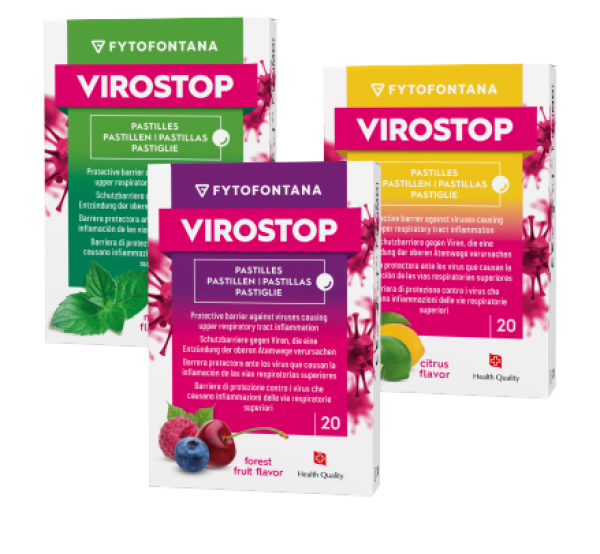Sore throats are mostly caused by viral infections. Fortunately, we know a way to directly combat viruses while also alleviating symptoms.
You're probably familiar with it: a scratchy throat, throat pain worsening when swallowing, a red throat, difficulty swallowing, and a hoarse voice. Sore throat is not uncommon and accompanies several illnesses, including upper respiratory infections. Fortunately, there are ways to alleviate it.
What can a sore throat mean?
A sore throat can be associated with several underlying issues. The first possibility is upper respiratory infections, with a significant portion being of viral origin, but bacterial infections are not uncommon either. Statistics show that 20 to 30% of sore throats
in children are caused by streptococcal infections, while others have different origins. However, a sore throat can also be a symptom of allergies, irritation from irritants, vocal cord strain, gastroesophageal reflux disease (GERD), or other less common causes.
If we experience severe throat pain accompanied by fever, difficulty swallowing food or water, or if our throat appears significantly red, it's time to visit a doctor. In other cases, we should treat ourselves as we would with common viral infections, remembering to provide targeted throat care. We should seek medical attention if the condition worsens or if we don't see improvement within a week.
Difference between viral and bacterial throat infections
Throat pain accompanies inflammation of the tonsils, larynx, and nasopharynx. As with all upper respiratory infections, they are usually caused by viruses, and less frequently by bacteria. It is not always easy to distinguish the culprit based on examination alone.
In unclear cases, a doctor may use a CRP test or opt for a Strep test. If the examination points to a bacterial origin of the infection, antibiotics will be necessary. If viruses are the cause, antibiotics won't help, but there are still ways to help our bodies suppress the virus.
What does it mean if the vocal cords are also affected
It is not uncommon for throat pain to be accompanied by symptoms related to vocal cord damage, such as hoarseness or a muffled voice. These difficulties can easily arise from vocal cord strain or a viral infection. In both cases, it helps to conserve your voice, avoid whispering, stay hydrated, and use inhalation. Keep in mind that these symptoms can either be a result of an ongoing infection or can create a favorable environment for its subsequent development. Therefore, it's essential to protect your upper respiratory tract from both viruses and bacteria.
How to fight viruses
Frequent sore throats are often caused by viral infections, such as the common cold. These infections are typically triggered by one of the 200 different respiratory viruses. Even though we don't use antibiotics for these infections, it doesn't mean they shouldn't be treated. Timely and targeted treatment can expedite recovery and help us avoid complications.
The best approach is to treat the throat using a combination of methods to alleviate symptoms, clear airways of mucus, and protect them with VIROSTOP products. VIROSTOP solution contains a blend of polyphenolic substances from extracts of five plants, forming a protective layer on the surface of the mucous membranes of the upper respiratory tract. These substances can block the binding sites of viral particles directly, whether it's particles from various cold viruses and the flu. VIROSTOP slows down the multiplication of viruses, making it easier for our immune system to cope with a smaller viral load.
We can create a protective film on the surface of the oral cavity and throat by using VIROSTOP oral spray or by sucking on VIROSTOP pastilles. The choice is ours, based on our preference. VIROSTOP oral spray does not sting after application and has a herbal taste . VIROSTOP pastilles have a milder taste and you can choose from citrus, mint or forest fruit flavors.
How to relieve a sore throat?
Throat pain, especially when swallowing, can significantly disrupt your day and make it challenging to eat. Throat pain in children can lead to a refusal to drink, worsening the situation further. Fortunately, there are several ways to alleviate feelings of pain, scratchiness, and swallowing difficulties.
For those seeking a natural form of treatment, gargling with saltwater, slowly sipping warm fluids like ginger tea with honey can be helpful. Some people find relief from chilled beverages. The sensation of irritation can be alleviated with mint candies or mint tea. Dry air exacerbates the condition, so it's good to monitor indoor air humidity in cases of throat irritation or consider inhalation.
There are various over-the-counter medications available to alleviate throat pain. However, if you're looking for one that not only slows the spread of viruses but also positively affects symptom relief, VIROSTOP is a suitable choice. It supports the normal functioning of the respiratory system and contributes to our natural resilience. Spray forms are suitable for ages 6 and up and have no reported side effects.







